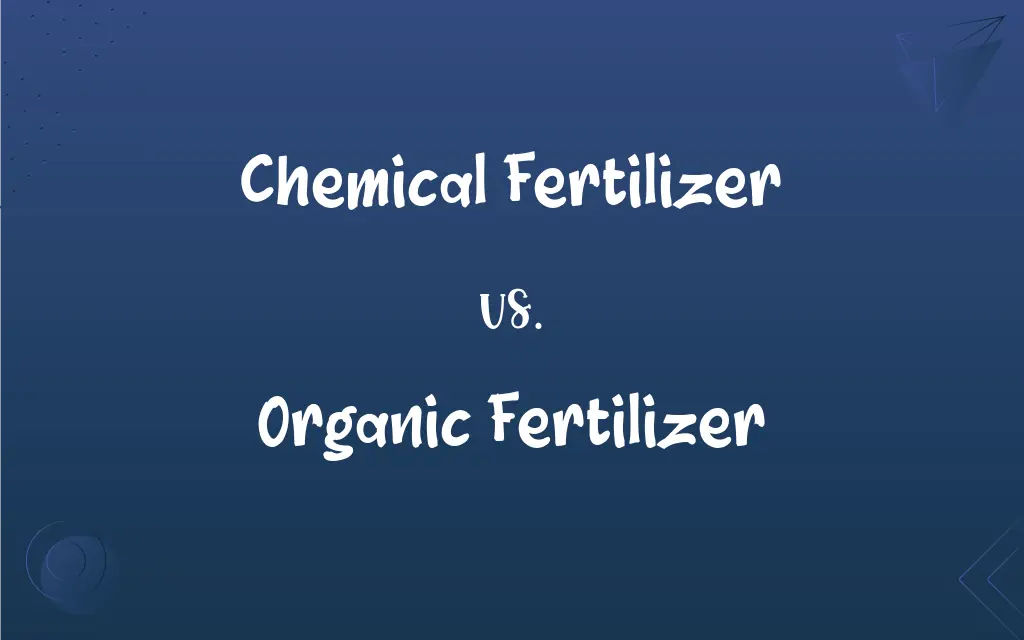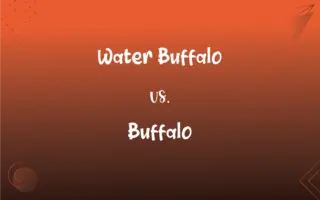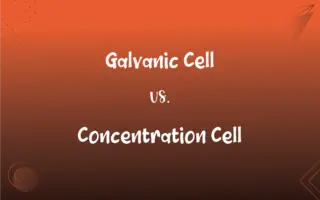Chemical Fertilizer vs. Organic Fertilizer: What's the Difference?
Edited by Aimie Carlson || By Janet White || Published on December 10, 2024
Chemical Fertilizer refers to man-made nutrients for plants. Organic Fertilizer refers to naturally derived nutrients for plants.

Key Differences
Chemical fertilizers are synthetic substances that provide essential nutrients to plants, manufactured through industrial processes. Organic fertilizers, on the other hand, are derived from natural sources like plant, animal, or mineral matter, and release nutrients more slowly.
The main components of chemical fertilizers are nitrogen, phosphorus, and potassium, often tailored for specific crop needs. Organic fertilizers, such as compost or manure, offer a broad spectrum of nutrients, often including micronutrients not found in synthetic versions.
Chemical fertilizers are known for their quick action and high nutrient content, providing immediate benefits to crops. Organic fertilizers improve soil structure and fertility over time, promoting healthy, sustainable growth.
Environmental impact is a significant difference; chemical fertilizers can lead to soil degradation and water pollution. Organic fertilizers, conversely, are considered eco-friendly, enhancing soil biodiversity without harmful residues.
In terms of cost, chemical fertilizers are usually cheaper and more readily available than organic options. However, organic fertilizers offer long-term benefits, including improved soil health and reduced environmental impact.
ADVERTISEMENT
Comparison Chart
Source
Synthetic, man-made
Natural, derived from living matter
Nutrient Release
Rapid and concentrated
Slow and gradual
Nutrient Composition
Specific nutrients (N, P, K)
Broad spectrum, including micronutrients
Impact on Soil Health
Can degrade soil structure
Improves soil structure over time
Environmental Consideration
Potential for pollution
Eco-friendly, minimal pollution
ADVERTISEMENT
Chemical Fertilizer and Organic Fertilizer Definitions
Chemical Fertilizer
Inorganic compounds used in farming to nourish plants.
Chemical fertilizer was applied to replenish nutrient-depleted soil.
Organic Fertilizer
Naturally derived substances used for soil fertility.
Using organic fertilizer, she grew a vibrant, healthy vegetable garden.
Chemical Fertilizer
Synthetic elements formulated for plant nourishment.
To achieve rapid growth, chemical fertilizer was used in the greenhouse.
Organic Fertilizer
A natural substance enriching soil with plant nutrients.
Organic fertilizer from compost improved the garden's health.
Chemical Fertilizer
Manufactured plant nutrients for agricultural use.
The garden's growth was enhanced by chemical fertilizer.
Organic Fertilizer
A eco-friendly nutrient source for plants from organic matter.
The organic fertilizer added vital nutrients back into the soil.
Chemical Fertilizer
A man-made, nutrient-rich substance for plant growth.
The farmer relied on chemical fertilizer for his high-demand crops.
Organic Fertilizer
Fertilizer made from natural, organic materials.
He used organic fertilizer to maintain his organic farm's certification.
Chemical Fertilizer
A synthetic substance providing essential plant nutrients.
Farmers use chemical fertilizer to boost crop yields.
Organic Fertilizer
Plant and animal-based products used as plant food.
Cow manure, an organic fertilizer, was spread in the fields.
FAQs
What are chemical fertilizers?
Synthetic substances providing essential nutrients to plants.
Are chemical fertilizers environmentally friendly?
They can lead to pollution and are generally not considered eco-friendly.
How do chemical fertilizers affect soil health?
They can degrade soil structure over time.
How do organic fertilizers benefit the soil?
They improve soil health and structure.
What is the main difference in nutrient release between the two?
Chemical fertilizers release nutrients quickly, while organic ones do so slowly.
Are organic fertilizers better for the environment?
Yes, they are eco-friendly and cause minimal pollution.
Can chemical fertilizers be overused?
Yes, overuse can lead to nutrient runoff and soil damage.
Do chemical fertilizers contain micronutrients?
Generally, they focus on primary nutrients like N, P, and K.
How do organic fertilizers affect plant growth?
They support gradual, sustainable plant growth.
What are organic fertilizers?
Naturally derived materials used to nourish plants.
Can chemical fertilizers be used in organic farming?
No, they are not allowed in organic farming practices.
How do organic fertilizers support sustainable agriculture?
They enrich the soil without depleting it, supporting long-term sustainability.
Do organic fertilizers provide micronutrients?
Yes, they often include a range of micronutrients.
Which fertilizer offers long-term soil health benefits?
Organic fertilizers contribute to long-term soil health.
Are there any regulations on chemical fertilizer use?
Yes, there are regulations in many countries to prevent environmental harm.
Are organic fertilizers suitable for all crops?
Generally, yes, but specific crops may have unique requirements.
Which is more cost-effective in the short term?
Chemical fertilizers are usually cheaper initially.
Is there a risk of plant burn with chemical fertilizers?
Yes, due to their high nutrient concentration.
Can organic fertilizers improve soil biodiversity?
Yes, they enhance soil microbial activity and diversity.
Can chemical fertilizers be used in all types of soils?
They can be used widely, but some soils may be adversely affected.
About Author
Written by
Janet WhiteJanet White has been an esteemed writer and blogger for Difference Wiki. Holding a Master's degree in Science and Medical Journalism from the prestigious Boston University, she has consistently demonstrated her expertise and passion for her field. When she's not immersed in her work, Janet relishes her time exercising, delving into a good book, and cherishing moments with friends and family.
Edited by
Aimie CarlsonAimie Carlson, holding a master's degree in English literature, is a fervent English language enthusiast. She lends her writing talents to Difference Wiki, a prominent website that specializes in comparisons, offering readers insightful analyses that both captivate and inform.







































































